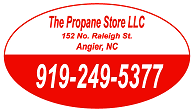Propane Safety
The Propane store, LLC recommends following all applicable safety guidelines while using propane. Call 919-249-5377 for more information.
Here at The Propane Store, safety is extremely important to us. We’ve taken the time to provide important safety information about propane for you to review.
First of all, what is propane?
Propane, also known as liquefied petroleum gas (LPG) is a type of fuel that is commonly used. When transported, it is a very cold liquid which cause a frostbite if it comes in contact with skin. This liquid turns into a gas once it is inside a tank/cylinder. Propane is a colorless, odorless gas in its natural form. Manufacturers add a chemical compound to it to make it detectable in the event of a leak or spill.
Propane becomes flammable when mixed with oxygen, and can be ignited by sources such as open flames, smoking materials, electrical sparks and static electricity.
Since propane vapors weigh more than air, they can build up in lower level areas like basements, crawl spaces or floors. The vapors can also be carried by air currents into a building.
How can propane get into your house?
Propane is usually delivered to your house in its liquid form, and turns into a gas in your tank. Propane tanks are usually painted white or silver in order to reflect heat and keep the pressure from getting too high within the tank.
On top of your tank, there’s a cover to protect it from weather and other physical damage. The cover protects the tank shut-off valve, the regulator, safety relief valve, and the tank gauge.
The pipes in your home carry the propane from the tank. Each pipe has a shut-off valve that can be closed to stop the flow to a particular appliance.
An appliance connector is a flexible tube that transports gas to the back of the appliance, from a pipe.
What to do if you smell gas:
- Extinguish all smoking materials and open flames right away. Do not use any lights, phones, or appliances, as they may trigger an explosion or fire.
- Evacuate everyone from the building/area where you think gas may be leaking.
- If it’s safe, turn off the gas supply valve on your tank, by turning it clockwise.
- Once you’re a safe distance away from the gas leak, call your propane retailer. If they’re not available, go ahead and call 911.
- Stay away from the area until a professional (propane retailer, emergency response etc) tells you it is safe to return.
- Make sure a qualified professional thoroughly checks out your system before you attempt to use any propane appliances.
What does propane smell like?
Propane has an unpleasant smell, similar to rotten eggs, a skunk’s spray or a dead animal. It’s a good idea to educate everyone in your home about the smell of propane, so that they are aware and can recognize signs of a leak.
Sometimes, it can be difficult for people to detect the smell of propane. If someone has a cold, allergies, or another medical condition, or their sense of smell has diminished with age, they might not be able to smell it. Propane smell can also be masked by the smell of tobacco smoke or cooking odors. Also, the smell might not be quite strong enough to wake a sleeping person. For these reasons, it’s important to be vigilant, and follow the proper guidelines on tank safety.
Cylinder Safety
Make sure you are following these guidelines when storing small cylinders:
- Do NOT store propane cylinders indoors or in an enclosed area (for example, basements, garages or sheds, etc.)
- Do NOT place them in areas exposed to excessive heat (120+ degrees) or near a heat source. This could result in fire or explosions.
- Do NOT store spare cylinders on or around a grill.
- Do NOT smoke in the area while handling or transporting propane cylinders, or have any ignition sources nearby.
How to safely transport small cylinders
- Transport tanks in a secure, upright position to prevent it from falling, shifting or rolling.
- Make sure the cylinder valve is always closed, and sealed with a plug if needed. Your propane retailer will know whether or not one is required.
- Do NOT keep a filled container inside a warm vehicle, or inside of a trunk.
- When you have a tank in your vehicle, go directly to your destination and remove the cylinder from the car immediately.
- Be aware of the local laws regarding the amount of small propane cylinders that are allowed to be transported in vehicles. Your propane retailer will have information on the local codes that apply.
Grilling Safety
When using a propane-run grill, here are some important things to keep in mind:
- Always follow the instructions provided by the manufacturer.
- Keep the grill open until you know for sure that it is lit.
- Keep disconnected hose-end fittings covered with protective caps or plastic bags to keep the grill clean when it’s not in use.
- Make sure propane tanks are stored outdoors in an upright position.
- In the event that you smell gas, turn off the cylinder valve by turning it clockwise, leave the area immediately and call 911. Make sure a qualified professional inspects the cylinder before attempting to use the grill again.
When using the grill, NEVER:
- Smoke while handling the tank.
- Use ignition sources to check for a leak.
- Pour accelerants on the grill (like lighter fluid or gasoline)
- Let children handle with the tank or grill
- Attempt to repair the grill yourself. Call a professional if you’re having grill or propane tank problems.
